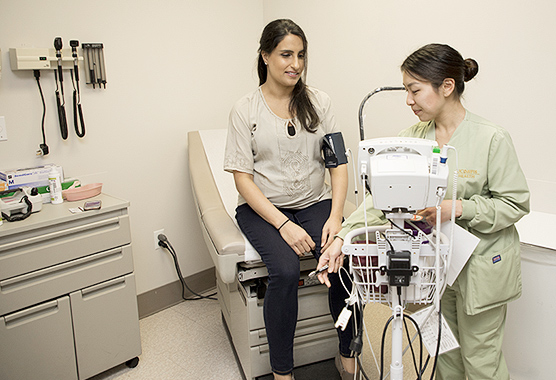Preeclampsia
Preeclampsia is a serious pregnancy complication. Our maternal fetal medicine specialists provide you with expert care and compassionate support.
Medically reviewed by Herman Hedriana, M.D. on April 24, 2025.

What Is Preeclampsia?
Preeclampsia is a serious pregnancy complication that may cause high blood pressure. It may also affect other organs, most commonly your kidneys, causing high protein levels in your urine. It typically occurs after 20 weeks of pregnancy. But it can also occur during delivery and up to six weeks after delivery. If left untreated, preeclampsia can cause serious, potentially life-threatening complications for both you and your baby.
The maternal fetal medicine specialists at UC Davis Health have expertise in diagnosing and treating preeclampsia. We specialize in treating high-risk pregnancies and offer compassionate, comprehensive care.
If you are experiencing a life-threatening emergency, our Obstetric Emergency Department provides round-the-clock care for urgent obstetrical needs.
Preeclampsia Symptoms
You may not know you have preeclampsia until your doctor checks your blood pressure and urine.
Common Symptoms
Signs of preeclampsia may include:
- Swelling in your face, hands and ankles
- Headaches
- Vision changes
Emergency Symptoms
Severe symptoms of preeclampsia may include:
- Severe headache
- Shortness of breath
- Upper abdominal pain
- Nausea or vomiting
- Seizures (eclampsia)
Causes and Risk Factors of Preeclampsia
The cause of preeclampsia is unknown. Experts believe it could be due to a problem with how the placenta develops.
Certain factors can increase your risk of preeclampsia, including:
Having Preeclampsia in the Past
If you had preeclampsia during a previous pregnancy, you have a higher risk of getting it again.
Being Pregnant With Multiples
Expecting twins, triplets or more puts you at a higher risk of preeclampsia.
Having Certain Health Conditions
If you have a history of high blood pressure, kidney disease, diabetes or autoimmune conditions like lupus, you have a higher risk of preeclampsia.
Being Pregnant for the First Time
Preeclampsia is more likely to occur during your first pregnancy.
Having Obesity
Obesity puts you at a higher risk for preeclampsia.
Being Older Than 35
If you are 35 or older, you have a higher risk of preeclampsia.
Diagnosing Preeclampsia
First, we will check your blood pressure. If it is 140/90 mmHg or higher, you may have preeclampsia.
We will order additional tests to confirm the diagnosis, such as:
- Urine analysis to check for protein
- Blood tests to check your kidney and liver function
- Fetal ultrasound to monitor your baby’s growth
- Nonstress test to see how your baby's heart rate changes when they move
Treatments for Preeclampsia
Your treatment depends on the severity of your condition and how far along you are in your pregnancy. Treatment may include:
Delivery
Because preeclampsia is a disease of pregnancy, the main treatment is to deliver the baby. If the baby isn’t mature enough for delivery, your doctor may prescribe medications to manage the condition until delivery is possible.
Medication
We may prescribe medications such as antihypertensive drugs to lower your blood pressure and anticonvulsant medication to prevent seizures. Your doctor will closely monitor you and your baby until delivery is possible.
Preventing Preeclampsia
While preeclampsia can’t be completely prevented, there are steps you can take to reduce your risk, including:
Take Baby Aspirin
Taking a baby aspirin every day may reduce your risk of preeclampsia by approximately 15%.
Manage Health Conditions
Work with your doctor to get conditions such as diabetes and high blood pressure under control.
Lose Weight
If you have obesity, do your best to lose weight before you conceive. Talk to your doctor about the best options for you.
Preeclampsia affects
5-8%Of pregnancies in the U.S.
Preeclampsia causes about
1 in 5Premature deliveries in the U.S.
Sources: Preeclampsia Foundation: FAQs and Premature Birth Creates Emotional Challenges
Request an Appointment
As Sacramento's No. 1 hospital, you'll benefit from unique advantages in primary care and specialty care. This includes prevention, diagnosis and treatment options from experts in 150 specialties.
Referring Physicians
To refer a patient, submit an electronic referral form or call.
800-4-UCDAVIS
Patients
Call to make an appointment.

